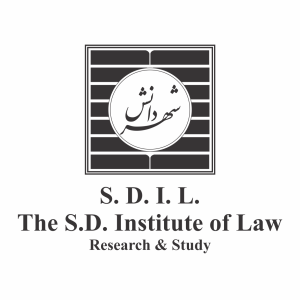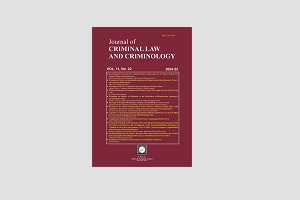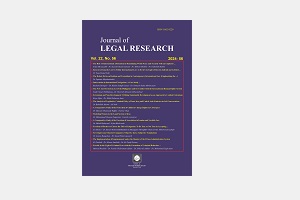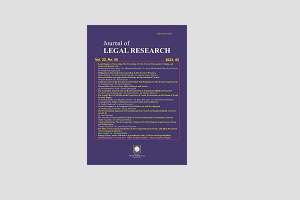Journal of
LEGAL RESEARCH
Number 34
Vol. XVII ● No. 2
Summer 2018
Managing Editor: Vahid Eshtiagh
Editor-in-Chief: Seyyed Ghasem Zamani
CONTENTS
Articles
Investigation of Legitimacy of Foreign State Intervention in Non-International Armed Conflict: Deliberating about Yemen Crisis
Dr. Aramesh Shahbazi & Pouya Berelian
Analyzing the Legal Dimensions of Transgenic Biotechnology on the base of Food Security
Dr. Najmeh Razmkhah & Dr. Bahareh Heydari
Feature Assignment in Electronic Evidence
Dr. Iraj Behzadi
Information Warfare in Terms of the Principle of Distinction between Combatants and Civilians in the Armed Conflicts
Keivan Eghbali
Abuse of Immunities and Privileges of International Organizations; Looking for a Solution
S. Ali Hosseiniazad & Masoud Ahsannejad
Explanation of Tools of Establishment of Inventive Step Requirement in Inventions (Prior art, Person Having Ordinary Skill in the Art)
Hamed Najafi & Mahsa Madani
National Interests from the Perspective of International Law and International Relations Theories
Heidar Piri & Parisa Dehghani
The Territorial Jurisdiction of Iranian Courts toward Cyber Crimes
Najmeh Ghaffari Elahi Kashani
The First Judgment of the ICC: The Applicable Law in Armed Conflicts between a State and Non-Governmental Groups
Samaneh Shabani
An Overview on the Concept of Consultation in the Bill of Commercial Procedure
Dr. Kourosh Kaviani & Parviz Rahmati & Reza Khodkar
COUNCIL REGULATION (EU) No 1259/2010 of 20 December 2010 Implementing Enhanced Cooperation in the Area of the Law Applicable to Divorce and Legal Separation
Translators: Dr. Mehdi Amini & Dr. Hossein Kaviar
Articles
Investigation of Legitimacy of Foreign State Intervention in Non-International Armed Conflict: Deliberating about Yemen Crisis
Dr. Aramesh Shahbazi
Assistant Professor of International Law, Faculty of Law and Political Sciences of
Allameh Tabataba’i University, Tehran, Iran
&
Pouya Berelian
M.A of International Law, Faculty of Law and Political Sciences of
Allameh Tabataba’i University, Tehran, Iran
Abstract:
The non-interventionism principle for non-interfering in internal and external affairs of states, being the given result of equality between governments, is one of the known, incontestable principles in international law and it not only enjoys a high position in united nation charter but also in international relationships of states. It’s position in international relationship is so significant that in several cases, it set the stage for transforming the current situation into an active controversy; thus, the regulators of the charter of United Nations tried to inhibit states from interfering in other state’s affairs through significant experiences of World War I and II as well as through relying on the principle of “banning the use of force by states”. However, the present tendency of states in international scene affirms the fact that the non-interventionism sometimes is subject to the interests of international governments, and the interests and expediencies of states affect the validity and legitimacy of this principle. This article analyzes the non-interventionism in the recent international procedure and the intervention of Saudi Arabia in Yemen and the assessment of the legitimacy of its intervention.
Keywords: Non-Interventionism, Non-International Armed Conflict, Saudi Arabia, Yemen, International Coalition.
Analyzing the Legal Dimensions of Transgenic Biotechnology on the base of Food Security
Dr. Najmeh Razmkhah
Assistant Professor, Ph.D. in International Law, Payam-e-Noor University, Iran
&
Dr. Bahareh Heydari
Assistant Professor, Ph.D. in International Law, Payam-e-Noor University, Iran
Abstract:
The scope of studies and research on the right to food security has expanded in recent decades. Its legal and ethical dimensions have been considered by researchers in legal studies. Food security as a human security component has become one of the most important human rights issues in every country in the world. The issue of the relationship between transgenic food products and their positive or negative role in ensuring each person’s right to food security and to meet their own nutrition needs and their families is currently been regarded. While advocates of this new technology speak of its constructive role in providing food security, Its critics disagree of eating transgenic foods because of the dangers which may be create for the health of people. According to the opposition, the production of such products not only does not provide food security but also violates the right to health of individuals.
Keywords: Food Security, Transgenic Food, Right to Food, International Covenant on Economic, Social and Cultural Rights.
Feature Assignment in Electronic Evidence
Dr. Iraj Behzadi
Graduated Ph.D. of Private Law, School of Law, Islamic Azad University, Tabriz, Iran
Abstract:
Almost nothing remains of the third millennium, directly or through the new information and communication technologies is associated. In order to secure and ensure the authenticity of electronic signatures in the diagnosis, also prove the relationship between the instrument and data assignment message, the computer sciences experts to develop two technologies in this field. A symmetric encryption or single key that has been saymtryk and was somewhat reassuring, electronic signature feature of this approach is attributable to the issuer. The latter is asymmetric cryptographic techniques; the two keys are mathematically related and complementary to an algorithm used. This type of encryption has a greater level of security enjoyed, there is no possibility of falsification and distortion, attributable to the issuer in terms of functionality is more reassuring.
In terms of capacity allocation electronic evidence, while the concept of electronic signatures, it is divided into two types of electronic signature, simple and reliable. As a simple electronic signature to sign documents contained in normal, it is an undeniable question. But sure the electronic signature as certificate, merely alleged capabilities of forgery and both terms in compliance with the principles and rules of construction are attributable to original creator.
Keywords: Electronic Evidence, Feature Assignment, Electronic Signatures, Symmetric Encryption, Asymmetric Encryption.
Information Warfare in Terms of the Principle of Distinction between Combatants and Civilians in the Armed Conflicts
Keivan Eghbali
Ph.D. Student of International Law, Faculty of Law and Political Sciences of
Allameh Tabataba’i University, Tehran, Iran
Abstract:
Principle of distinction between combatants and civilians, as fundamental rule of humanitarian law, has a basic role in protection of civilians against destructive effects of war. For continuation of this ability, the principle of distinction is needed to comply with new phenomena, which thanks to advances in technology, nowadays appear in conflict areas.
As one of these phenomena, the information warfare, for its non-kinetic nature and destructive effects, could create doubts about its compatibility with the principle of the distinction, when one of belligerent parties uses it against other.
This paper examines how the principle of distinction between combatants and civilian can be implemented in this situation.
Keywords: Information Warfare, Principle of Distinction between Combatants and Civilians, Computer Network Attack, Combatant, Civilian, Military Object, Civilian Object, Direct Participation of Civilians in Armed Conflict.
Abuse of Immunities and Privileges of International Organizations; Looking for a Solution
S. Ali Hosseiniazad
Ph.D. Student in International Law at Faculty of Law and Political Sciences of
Allameh Tabataba’i University, Tehran, Iran
&
Masoud Ahsannejad
Ph.D. Student in International Law at University of Qom, Qom, Iran
Abstract:
The privileges and immunities which states possessed in the territories of other states didn’t remain only between the first subjects of international law. It particularly in the recent two centuries included the new subjects i.e. International organizations which enjoy privileges and immunities in order to ensure their independence and proper functioning.
International organizations and their officials can always abuse the privileges and immunities which they enjoy. For example they can under the exemption from customs duties import forbidden articles into host states or under the veil of immunity commit unlawful acts in their headquarters.
Regarding the abuses, the first measure refers to supervisory and preventive measures and the secondary to the measures which the organizations and victim states can take in the cases of abuses such as waiving immunities and providing the possibility of prosecution by national courts and there are also some ways of compensating after the abuses take place.
Keywords: International Organizations, International staffs, Immunities and Privileges, Abuse.
Explanation of Tools of Establishment of Inventive Step Requirement in Inventions (Prior art, Person Having Ordinary Skill in the Art)
Hamed Najafi
Ph.D. Student of Private Law, Faculty of Law, Tarbiat Modares University and Researcher at Comparative Law Institute of Tehran University, Tehran, Iran
&
Mahsa Madani
Master of Private Law, University of Tehran, Tehran, Iran
Abstract:
Assessment and establishment of inventive step requirement has a great importance. This issue accomplish with the patent offices and courts. In the major of patent systems for the assessment of this requirement has been rule that invention has inventive step if with regard to the prior art do not obvious for the person having ordinary skill in the art. With this explanation, prior art and the person having ordinary skill in the art are two very important tools that used for the assessment of the inventive step of invention. Usually the prior art predicated to the all of information that is available for the public in date of application or priority date. Person having ordinary skill in the art is hypothetical thing that attributed to him special characters and capabilities. In the present article we try with comparative view and respect to the Iran’s law at first express the concepts of invention and patent then specify the content of the prior art and finally study and analyse the attributed characters and capabilities of person having ordinary skill in the art and offer appropriate proposals in generally and Iranian law.
Keywords: Invention, Patent, Prior Art, PHOSITA, Iranian Law.
National Interests from the Perspective of International Law and International Relations Theories
Heidar Piri
Ph.D. Candidate in Public International Law, Shahid Beheshti University, Tehran, Iran
&
Parisa Dehghani
Ph.D. Candidate in Public International Law, Islamic Azad University,
Science and Research Branch, Tehran, Iran
Abstract:
One of the most controversial issues, as well as complicated and fundamental concepts in international legal system and international relations, is the debate on the national interest between different schools. Theorists and analysts have used the concept of national interest to study and analyze the objectives, goals and behavioral patterns of international actors and the states’ foreign policy. The paper methodology is trying to analysis the most important theories – Realism, Neorealism, Idealism, Marxism, Anarchism, Liberalism and Constructivism – around the so-called national interests and also important theoretical frameworks in this context. Therefore, it is attempted to provide a theoretical evaluation of this concept between above mentioned theories so that to fill the gap of national interest Assessment by the major theories of international relations.
Keywords: National Interest, International Law, International Relation, Realism, Neorealism, Idealism, Marxism, Anarchism, Liberalism, Constructivism.
The Territorial Jurisdiction of Iranian Courts toward Cybercrimes
Najmeh Ghaffari Elahi Kashani
Ph.D. Student of Criminal Law, Faculty of Law and Political Science,
Tehran University, Tehran, Iran
Abstract:
The special nature of cyber space and the crimes that committed there, led to the adoption of Computer Crime Act in 1388. Then the legislator repealed the rules of procedure in Computer Crime Act, applied minor changes to them and ultimately attached them to Criminal Procedure Act 1392. But computer crimes procedure in criminal procedure act, includes weak and vague provisions about territorial jurisdiction which is very important in international criminal law. In this section, it is not provided an exact criterion for determination of Iran’s sovereignty and location of cybercrimes which are constituent parts of territorial jurisdiction. In this article, by demystification of the obscure phrases about territorial jurisdiction in computer crimes and presentation of solution about defects, we will see Iranian courts when exercise territorial jurisdiction over cybercrimes.
Keywords: Cybercrimes, Territorial Jurisdiction, The Sphere of Sovereignty in Cyber Space, The Location of Cybercrime, Computer Crime Procedure.
The First Judgment of the ICC: The Applicable Law in Armed Conflicts between a State and Non-Governmental Groups
Samaneh Shabani
Ph.D. Student of International Law, Paradise Alborz, University of Tehran, Tehran, Iran
Abstract:
In explaining applicable law in cases where a foreign government is being persecuted against a non-governmental organization based in another country, the ICC, in its first vote, has argued that an armed conflict between an occupant power and a non-governmental organization in the occupied territories are considered a non-international armed conflict, and the international armed conflict is essentially occurring between the two governments. But according to the theory that we are discussing in this paper, such a conflict is considered as an international armed conflict and the provisions of this type of conflict will be enforced. The benefit of such an interpretation is more support for those involved persons.
Keywords: International Armed Conflicts, Internal Armed Conflicts, The Applicable Law, International Criminal Court.
An Overview on the Concept of Consultation in the Bill of Commercial Procedure
Dr. Kourosh Kaviani
Associate Professor, Faculty of Law and Political Sciences of
Allameh Tabataba’i University, Tehran, Iran
&
Parviz Rahmati
L.L.M in Law and Economics, Faculty of Law and Political Sciences of
Allameh Tabataba’i University, Tehran, Iran
&
Reza Khodkar
Ph.D. Student of Privacy Law, University of Judicial and Sciences
Administrative Services, Tehran, Iran
Abstract:
The complexity of the commercial affairs requires for the settlement of the relative commercial disputes to be handled by the specialized courts since accuracy and time is of essence in the commercial matters. Needless to say, the two aforementioned factors would not be complied with in the general courts due to the overload of their work. Issuing fair judgments in the commercial disputes would require the access to the credible commercial precedent and use of the commercial specialists.
For this purpose, the concept of consultation has been predicted in the recent Bill of Commercial Procedure Law. In this article we would study the question of whether the said concept as stipulated in the Bill would result in the commercial courts to be more efficient.
In order to answer to this question, the cost benefit analysis has been used. The study led to the conclusion that while the act of the lawmakers recognizing the consulting concept is admirable but the said concept entails deficiencies due to neglecting certain subtle points which would in return result in imposing some costs on the judicial system.
Keywords: Commercial Court, Consultant, Expert, Consultant’s Responsibility, Efficiency.
COUNCIL REGULATION (EU) No 1259/2010 of 20 December 2010 Implementing Enhanced Cooperation in the Area of the Law Applicable to Divorce and Legal Separation
Translators:
Dr. Mehdi Amini
Assistant Professor, Department of Law, Shahrekord University, Chaharmahal and Bakhtiari, Iran
&
Dr. Hossein Kaviar
Assistant Professor, Department of Law, Arak University, Arak, Iran
Abstract:
Along with the EU’s attempts to consistency of resolution of conflict of laws’ rules, in the union level, and after enforcement of 1st Rome regulation (on contractual), and 2nd Rome (on non-contractual obligations), European council issued some rules about applicable law on divorce cases, in December 2010, which is called 3rd Rome regulations. These regulations accept the parties’ wills to choose the applicable law on divorces in some limited cases. According to Article 5 of these rules, parties could choose the applicable law on divorce case, among their lex loci, their prior lex domicilii, and the law of respecting country of one of the parties or lex fori. Parties should make a written agreement to choose applicable law that should be concluded, maximally, up to the hearing session. In the case of failure of determination of applicable law by couples, the lex loci while proceeding, their prior lex domicilii, their respecting country’s law (if they have same nationality), and at last the lex fori will be applied respectively. If there is no regulation for divorce in applicable law, or there is a prevention base on gender for one of the parties, the lex fori will be replace, this rule would have effect on divorce cases in those countries in which divorce is in the Men’s hands, such as Iran. Rejecting of renvoi is one of those matters that have been emphasized in these regulations. So the substantive rule determined country, by these regulations, is considered not the rules of resolution of conflict of laws.
Keywords: 3rd Rome Regulations, EU, Divorce, Applicable Law, Chosen Law, Renvoi, Public Policy.





